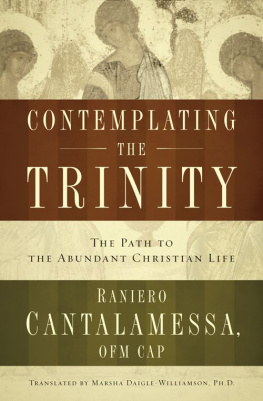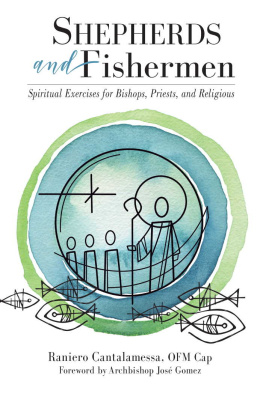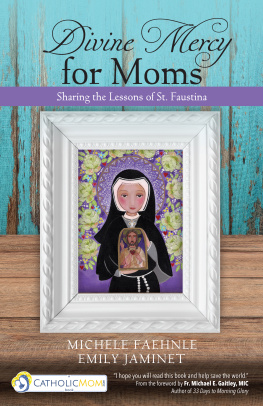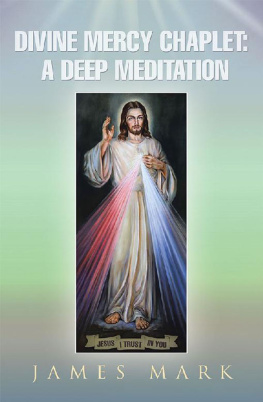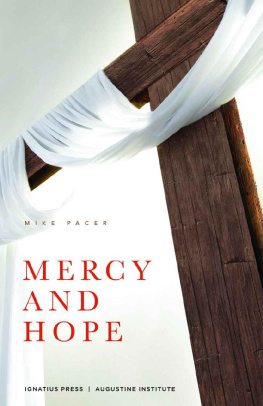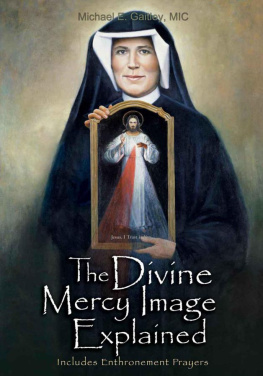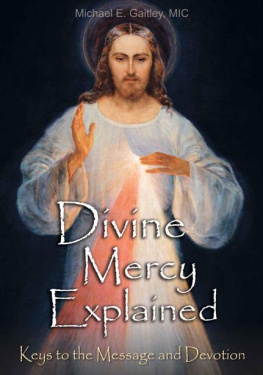Raniero Cantalamessa - The Gaze of Mercy: A Commentary on Divine and Human Mercy
Here you can read online Raniero Cantalamessa - The Gaze of Mercy: A Commentary on Divine and Human Mercy full text of the book (entire story) in english for free. Download pdf and epub, get meaning, cover and reviews about this ebook. year: 2015, publisher: The Word Among Us Press, genre: Religion. Description of the work, (preface) as well as reviews are available. Best literature library LitArk.com created for fans of good reading and offers a wide selection of genres:
Romance novel
Science fiction
Adventure
Detective
Science
History
Home and family
Prose
Art
Politics
Computer
Non-fiction
Religion
Business
Children
Humor
Choose a favorite category and find really read worthwhile books. Enjoy immersion in the world of imagination, feel the emotions of the characters or learn something new for yourself, make an fascinating discovery.

- Book:The Gaze of Mercy: A Commentary on Divine and Human Mercy
- Author:
- Publisher:The Word Among Us Press
- Genre:
- Year:2015
- Rating:5 / 5
- Favourites:Add to favourites
- Your mark:
- 100
- 1
- 2
- 3
- 4
- 5
The Gaze of Mercy: A Commentary on Divine and Human Mercy: summary, description and annotation
We offer to read an annotation, description, summary or preface (depends on what the author of the book "The Gaze of Mercy: A Commentary on Divine and Human Mercy" wrote himself). If you haven't found the necessary information about the book — write in the comments, we will try to find it.
Raniero Cantalamessa: author's other books
Who wrote The Gaze of Mercy: A Commentary on Divine and Human Mercy? Find out the surname, the name of the author of the book and a list of all author's works by series.
The Gaze of Mercy: A Commentary on Divine and Human Mercy — read online for free the complete book (whole text) full work
Below is the text of the book, divided by pages. System saving the place of the last page read, allows you to conveniently read the book "The Gaze of Mercy: A Commentary on Divine and Human Mercy" online for free, without having to search again every time where you left off. Put a bookmark, and you can go to the page where you finished reading at any time.
Font size:
Interval:
Bookmark:
A Commentary on
Divine and Human Mercy
RANIERO CANTALAMESSA
Translated by Marsha Daigle-Williamson, PhD

To His Holiness Pope Francis,
who has placed mercy at the center
of the life and reflection of the Church.
English language edition 2015 by Raniero Cantalamessa
First published in Italian by Edizioni San Paolo s.r.l.
Piazza Soncino 5 20092 Cinisello Balsamo
Milan, Italy, 2015 by Edizioni San Paolo, s.rl.
All rights reserved.
Published by The Word Among Us Press
7115 Guilford Drive
Frederick, Maryland 21704
www.wau.org
19 18 17 16 15 12 3 4 5
ISBN: 978-1-59325-285-4
eISBN: 978-1-59325-477-3
Scripture texts used in this work are taken from The Catholic Edition of Revised Standard Version Bible, copyright 1965, 1966 by the Division of Christian Education of the National Council of the Churches of Christ in the United States of America. Used with permission. All rights reserved.
Cover design by Faceout Studios
Cover image: Georges Rouault(18711958), The Head of Christ @ 2015 Artists Rights Society (ARS), New York / ADAGP, Paris Photo image @ The Cleveland Museum of Art
No part of this publication may be reproduced, stored in a retrieval system, or transmitted in any form or by any meanselectronic, mechanical, photocopy, recording, or any otherexcept for brief quotations in printed reviews, without the prior permission of the author and publisher. Made and printed in the United States of America
Library of Congress Control Number: 2015953884
I read the statement somewhere (I cant remember where) that Too many discussions about love circle around its mystery rather than entering into it. I believe the same must be said about mercy, which is a particular aspect of love. The discussion that I am about to present belongs to the first category and circles around the mystery of mercy. To enter into the mystery, we need to be attracted to it. One can knock at the door, but the door can only be opened from the inside. The mystery of mercy is in fact identified in the Bible with the pure and simple mystery of God. It is the burning bush that one cannot approach without our sandals being removed, that is, without having abandoned the pretense of moving ahead on our own with our own arguments.
So why, then, write about mercy? The question is a real one. What helped me to get beyond it is the memory of a Gospel episode, the episode of the paralytic narrated by the Gospel writer John, who was at the pool of Bethsaida for thirty-eight years (see John 5:1ff). People believed that the water in the pool had the power to heal the first person who plunged into it when an angel stirred the water. The unfortunate man complained to Jesus that he had no one to lower him into the water at just the right time.
The pool worked the miracle, but it was necessary for someone to help the paralytic get in it, to plunge him into it. This is the goal and the hope that make me venture to write these pages: to encourage and push myself as I write to leap into the great healing pool of Gods mercyand, if possible, those who would read this book. Its waters are once again being stirred for a whole year, thanks to the Jubilee Year of Mercy called by Pope Francis on the occasion of the fiftieth anniversary of the Second Vatican Council.
The link between the theme of mercy and the Second Vatican Council is anything but arbitrary or minor. St. John XXIII, in his opening address for the council on October 11, 1962, pointed to mercy as the new approach in the councils style: The Church has always opposed... errors [throughout the ages]. Frequently she has condemned them with the greatest severity. Nowadays, however, the Spouse of Christ prefers to make use of the medicine of mercy rather than that of severity. In a certain sense, half a century later the Year of Mercy celebrates the faithfulness of the Church to this promise.
A comment on this books contents. The word mercy (hesed in Hebrew, eleos in Greek) recurs in the Old Testament and the New Testament in two contexts and with two different meanings, even though they are interdependent. Its first and original meaning indicates the sentiment that God fosters toward human beings. Its second meaning indicates the sentiment that human beings should foster toward one another: mercy as a gift and mercy as a duty, or rather, as we will see, as a debt.
Consequently, in the first part of the book, we will reflect on Gods mercy, on its manifestations in the history of salvation and in Christ and on the means of grace in the Churchs sacraments through which mercy reaches us. In the second part, we will reflect on our duty to be merciful and on the works of mercy, in particular on the duty of the Church and its ministers to be merciful to sinners, just as Jesus was.
It has been rightly said about Orthodox icons that the body is included for the sake of the face, and the face is included as a frame for the gaze. That is the reason for the choice of the books title and for the cover image. It is rare to find an image that speaks to us of the merciful gaze of Christ with more power than this face of Christ by Georges Rouault.
. All quotes from papal and council documents in this book are from the Vatican website.
John begins his Gospel by saying, In the beginning was the Word (John 1:1). He does not say the beginning was the Word, but in the beginning was the Word. The Word was in the beginning with God (1:2) but was not itself the beginning. The beginning of everything is not the Word or an abstract divine essence or a Supreme Being but the Person of the Father.
According to the traditional view of the Greek Fathers, which is increasingly more widely shared by Latin theology today, the concept of unity in God is not separable from the concept of the Trinity but forms a unique mystery and flows from a unique act. With our limited human vocabulary, we can say that the Father is the fountain, the absolute origin, of the movement of love. The Son cannot exist as the Son unless he receives from the Father all that he is. The Father is the only one, even within the Trinity, who does not need to be loved in order to love.
The unique God of the Christians is thus the Fathernot, however, conceived of on his own (how can he be called father unless he has a son?), but as the Father always begetting the Son and giving himself to him with an infinite love that unites them both, which is the Holy Spirit.
This love in the Trinity, which constitutes the Trinity, is their very nature, to use a word accessible to us even if it is inadequate; it is not grace. It is love, not mercy. The Father loving the Son is not a grace or a concession; it is in a certain sense a necessity. The Father needs to love in order to exist as Father. The Son loving the Father is not a concession or a grace; it is an intrinsic necessity even if it occurs with the utmost freedom; the Son needs to be loved and to love in order to be the Son. The Father begets the Son in the Holy Spirit by loving him; the Father and the Son breathe forth the Holy Spirit in loving each other.
What St. Bernard says about love is fully and absolutely realized only in God; it has no other why outside itself: Love suffices in itself; it pleases in itself and for its own sake. It is its own merit and reward. Love does not need any cause beyond itself, nor any fruitits fruit is its use. I love because I love; I love so that I may love. Love is enough unto itself, but nothing is enough for love! The action of God toward human beings is proof of that!
Font size:
Interval:
Bookmark:
Similar books «The Gaze of Mercy: A Commentary on Divine and Human Mercy»
Look at similar books to The Gaze of Mercy: A Commentary on Divine and Human Mercy. We have selected literature similar in name and meaning in the hope of providing readers with more options to find new, interesting, not yet read works.
Discussion, reviews of the book The Gaze of Mercy: A Commentary on Divine and Human Mercy and just readers' own opinions. Leave your comments, write what you think about the work, its meaning or the main characters. Specify what exactly you liked and what you didn't like, and why you think so.

